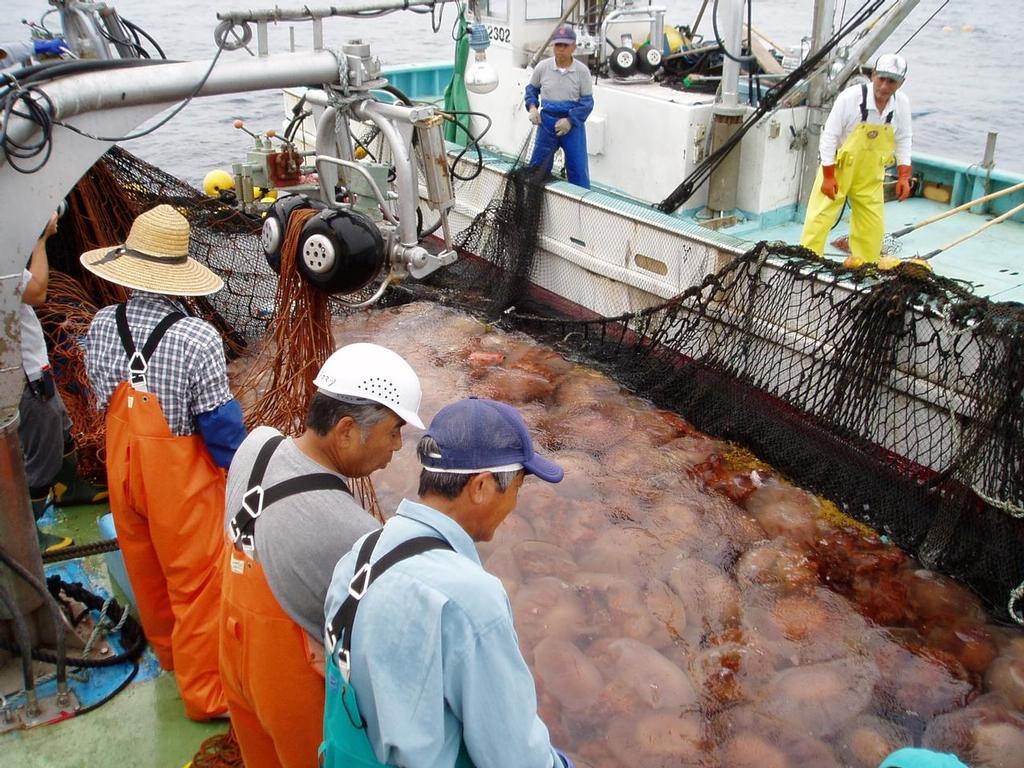JEROS- the jellyfish juicer
by Jeni Bone on 7 Oct 2013

Japanese Nomura jellyfish swarm annually SW
Scientists from the Korea Advanced Institute of Science and Technology in Daejeon, South Korea, have developed a 'jellyfish terminator' robot which ranges the ocean, detects the marine coelenterates and kills them.
The robot, named JEROS, can destroy 900kg of jellyfish an hour. It could be worth millions of dollars a year, and save the Asian seafood industry.
Jellyfish are growing in numbers around the world and cost marine industries many millions in lost profits and damage to equipment every year.
But a South Korean scientist has come up with a killer robot which shreds the jellyfish and destroys them within seconds. The machine is called JEROS (short for Jellyfish Elimination Robotic Swarm) and can kill 900kg of the gelatinous creature in just one hour with its deadly propellers.
The robot patrols the sea for the creatures using a GPS system attached to motors below the surface and can plan its attack using cameras. The deadly system then traps the animals in a submerged net before ingesting them through the blades.
Research team leader, Hyun Myung, director of the Urban Robotics Lab at the Korea Advanced Institute of Science and Technology, designed the system so three robots could travel together and act as one.
He began his designing in 2009 when the South Korean marine industry lost an estimated US$300 million because of the creatures.
'Once jellyfish are detected using a camera, the jellyfish removal scenario is started with generating efficient path to remove the jellyfish,' Professor Myung Hyun wrote in the journal Advances in Intelligent Systems and Computing. 'Finally, the jellyfish is sliced up with the grid installed underneath the JEROS by following the generated path.'
The system, which is cheaper than trapping them in a net, would save billions for marine industries around the world and could save lives.
Only last week, a massive cluster of jellyfish forced Sweden’s Oskarshamn nuclear plant to shut down after it caused a blockage in the pipes. The facility closed its third reactor for the second time in one weekend after a giant wave of jellyfish clogged the pipes that bring in cool water to the plant’s turbines.
It was not the first time operators at Oskarshamn have been forced to close reactors due to jellyfish, and marine biologists say could become more common across the globe.
Lene Moller, a researcher at the Swedish Institute for the Marine Environment said: 'It's true that there seems to be more and more of these extreme cases of blooming jellyfish. But it's very difficult to say if there are more jellyfish, because there is no historical data.’
Moller said the biggest problem was that there's no monitoring of jellyfish in the Baltic Sea to produce the data that scientists need to figure out how to tackle the issue.
Jellyfish take over an area and have the potential to turn it in to a 'dead zone' for other marine life, which can impact on a region’s fishing and seafood production.
Huge annual jellyfish blooms have been cropping up in the Black Sea, the Mediterranean, as well as the Gulf of Mexico, the Yellow and Japan Seas, with instances of jellyfish infestations on the west and east coasts of Australia.
Last year alone, nuclear power plants in Scotland, Japan, Israel and Florida, and a desalination plant in Israel, were forced to shut-down because jellyfish were clogging the water inlets. The entire Irish salmon industry was wiped out in 2007 after a plague of billions of mauve stingers attacked the fish cages.
Perhaps the most extraordinary blooms have been those occurring in waters off Japan. There, refrigerator-sized gelatinous monsters called Nomuras, weighing 485lb (220 kg) and measuring 6.5ft (2m) in diameter, have swarmed the Japan Sea annually since 2002, clogging fishing nets, overturning trawlers and devastating coastal livelihoods. These assaults have cost the Japanese fisheries industry billions of yen in losses.
Scientists believe the proliferation is related to warmer sea temperatures and over-fishing in some places, and marine ecologists are warning of worse to come.
Australian marine scientist, Anthony Richardson published a research paper entitled The jellyfish joyride, in which they warn that if we do not act to curb current blooms, we will experience runaway populations that will cause open oceanic ecosystems to flip from ones dominated by fish biodiversity to ones dominated by jellyfish.
So, JEROS, get to work and pulp these prehistoric medusas!
Check out the JEROS in action!
If you want to link to this article then please use this URL: www.sail-world.com/115469